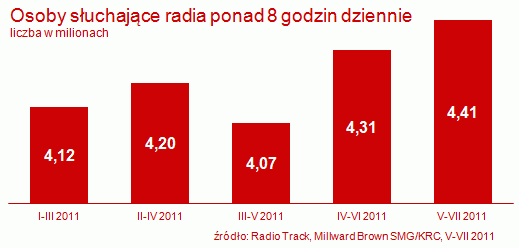
More than half of these listeners, whom Radio Track calls heavy users, have a secondary education, more than double the next group of listeners with higher education.
Breakdown of Radio "Heavy Users" by Education Level
- Secondary - 51.2%
- Higher - 23.3%
- Vocational - 17.8%
- Primary - 7.6%
According to Radio Track, among those spending more than 6 hours with the radio, there is a higher proportion of white-collar workers than in the general population - they make up 22.1% of these listeners. There are also more business owners (10.9%), directors and professionals (14.8%), and skilled laborers (22.4%).
These data are significant due to the advertising potential. It’s no surprise they’re often highlighted, as in a recent release by the Radio Research Committee, which emphasized that company heads listen to their favorite stations more than average.
The listeners who spend the most time with the radio are primarily adults: people aged 25-39 make up 37.8% (significantly more than 29.3% of all respondents), and those aged 40-59 account for 39.3% (compared to 35.7% of all respondents).
It’s worth noting that the increase in people who keep their radios on for long periods may be influenced by the summer season, when Poles traditionally listen to the radio longer and more often. Additionally, programming and music changes are increasingly tailored to meet audience expectations and needs.
COMMERCIAL BREAK
New articles in section Media industry
How artificial intelligence misrepresents the news. PBC analysis
Sylwia Markowska
In news summaries generated by the most popular models in Polish, as many as 46% of responses contained at least one significant error, 27% had serious issues with sources (missing, misleading, or incorrect), and 19% contained hallucinations and outdated information.
Children and communication with machines. Experiment by SWPS researchers
SWPS
How do primary school students treat humanoid robots? Researchers from SWPS University have shown that in most cases, children relate to robots politely, and younger children and girls more often perceive them as possessing human characteristics.
Streaming platforms in Poland. What criteria determine the choice
Paweł Sobczak
Price, indicated by 54.2% of respondents, and subject matter (54% of indications) are the most important factors influencing users' choice of content on streaming services. The service brand is mentioned by 18.1% of those surveyed.
See articles on a similar topic:
Decline in Trust in Media. Analysis of the Reuters Digital News Report 2024
Krzysztof Fiedorek
The “Digital News Report 2024” by the Reuters Institute for the Study of Journalism highlights alarming trends concerning the declining interest in news and decreasing trust in media. These changes are not temporary but have become a long-term trend.
Social Media in 2025. Generational Differences Are Crystal Clear
KFi
More and more people are saying they’re cutting back on time spent on social media. And while this doesn’t mean a mass exodus, the trend is clear. According to latest GWI report, 31% of users said they had reduced their social media use. There’s also a subtle frustration.
Can a Robot Be Good Boss? Researchers from SWPS Look for Answers
SWPS
A robot giving orders at work is no longer a science fiction scenario - it's a research topic. Scientists from SWPS University in Poland set out to find out whether a robot can effectively manage human workers.
Online News Portal Readers in Poland. Loyalty Analysis
Bartłomiej Dwornik
Among news portals, Onet has the highest number of users. However, in terms of reader loyalty, it falls behind Wirtualna Polska. When looking specifically at news readers, Gazeta takes the lead, though it ranks poorly in Google search positioning.






























